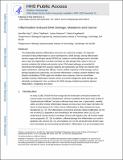Inflammation-induced DNA damage, mutations and cancer
Author(s)
Kay, Jennifer Elizabeth; Thadhani, Elina; Samson, Leona D; Engelward, Bevin P
DownloadAccepted version (2.117Mb)
Publisher with Creative Commons License
Publisher with Creative Commons License
Creative Commons Attribution
Terms of use
Metadata
Show full item recordAbstract
The relationships between inflammation and cancer are varied and complex. An important connection linking inflammation to cancer development is DNA damage. During inflammation reactive oxygen and nitrogen species (RONS) are created to combat pathogens and to stimulate tissue repair and regeneration, but these chemicals can also damage DNA, which in turn can promote mutations that initiate and promote cancer. DNA repair pathways are essential for preventing DNA damage from causing mutations and cytotoxicity, but RONS can interfere with repair mechanisms, reducing their efficacy. Further, cellular responses to DNA damage, such as damage signaling and cytotoxicity, can promote inflammation, creating a positive feedback loop. Despite coordination of DNA repair and oxidative stress responses, there are nevertheless examples whereby inflammation has been shown to promote mutagenesis, tissue damage, and ultimately carcinogenesis. Here, we discuss the DNA damage-mediated associations between inflammation, mutagenesis and cancer.
Date issued
2019-07Department
Massachusetts Institute of Technology. Department of Biological Engineering; Massachusetts Institute of Technology. Department of BiologyJournal
DNA Repair
Publisher
Elsevier BV
Citation
Kay, Jennifer Elizabeth et al. "Inflammation-induced DNA damage, mutations and cancer." DNA Repair 83 (November 2019): 102673 © 2019 Elsevier B.V.
Version: Author's final manuscript
ISSN
1568-7864